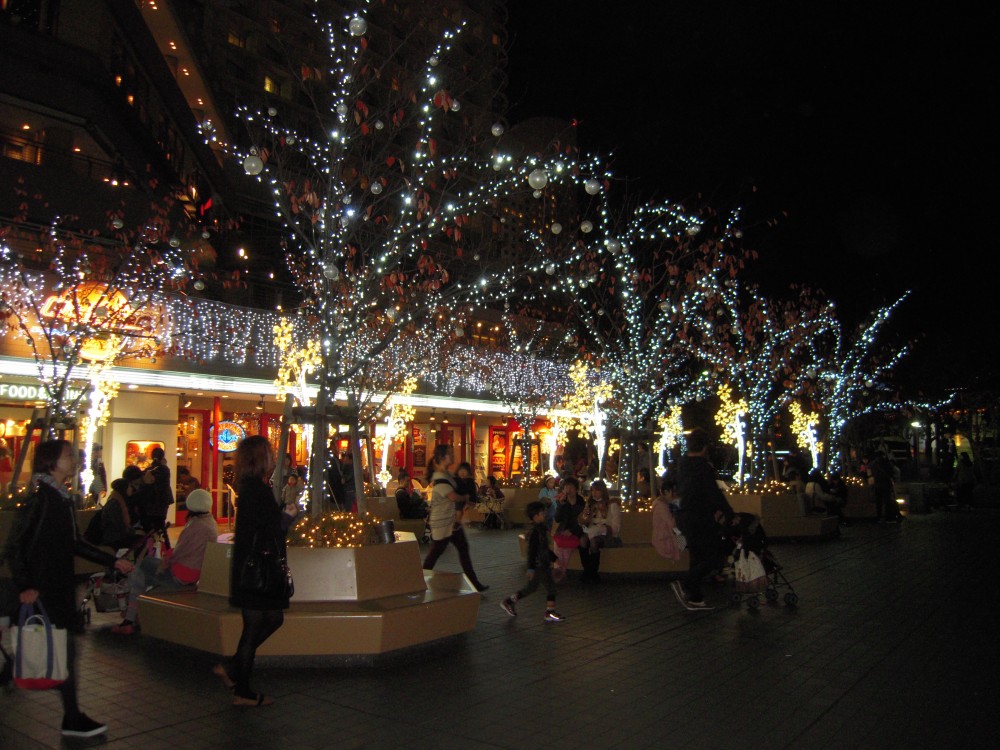
Yokohama last Christmas
As the Christmas season approaches, you can be certain of one thing. You’ll hear Christians groaning or lamenting about commercialism, materialism and the loss of the true “reason for the season.” We do it every year and most of us can’t help but find ourselves entangled in it in some way.
My two trips to Japan have three things in common. 1) They were in winter 2) They were during an election campaign 3) They were during the build up to Christmas. So far, I’ve only seen Japan cold, campaigning and Christmassy. And let me tell you, if you’ve ever felt that Christmas in Australia was turning into an over commercialised, Christless festival – you should visit Japan one December. All of the shopping centre decorations and festive trappings are there, but public awareness of Jesus is almost nil.
I use Christmas as an example, because the season in Japan is a powerful juxtaposition between celebrating the birth of a Saviour and adopting a fun, Western holiday as an opportunity to sell a lot of products (think the emergence of Halloween in Australia over the last decade). The place of consumerism within Japanese society is on display, while the good news of Jesus is conspicuously absent.
While the Japanese economy has not enjoyed the boom-growth it experienced from the post-war years through to the 1980s, Japan remains one of the most materially prosperous nations on Earth. It is also the home to some of the world’s major production companies and technological innovation. The quality of life and material comforts enjoyed by most Japanese is incredibly high when compared to many other parts of the world.

Anyone for shopping?
In The Japanese and Christianity: Why is Christianity not widely believed in Japan? Samuel Lee observes that Japanese work very hard to obtain and sustain their quality of life and tend to consume heavily when it comes to various goods and forms of entertainment as a way of relieving the stress of their work and study lives.[1] According to Lee, the already crowded “balance” between work and recreation makes it difficult for Japanese to explore spiritual matters or commit to religious routines such as weekly church attendance.[2]
There is debate as to whether Japanese suffer from what has been termed “affluenza” – a state of emotional and psychological unwellness that arises from living in a society that focuses too much on the accumulation of material wealth. The research carried out by the World Health Organisation and interpreted by British social researcher and proponent of the affluenza idea, Oliver James, suggests that Japanese suffer from emotional distress linked to their views of wealth less than people in a range of other countries.[3] This may be the case, however I would propose that the challenge of materialism in Japan from a Christian perspective perhaps lies in the fact that consumerism and entertainment may be the functional “liberators” from the hardships of Japanese life and therefore constitute a sort of pseudo-religion. Additionally, we have seen in earlier articles that mental health issues and general unhappiness are problems in Japanese society and the fact is that material or technological indulgence will not resolve these negative experiences of life in any meaningful way.
On the other hand, there is evidence from within Japan that some are finding the clutter of a materialistic, consumer lifestyle to be too much and are looking for a new approach to life. A philosophy known as Danshari has gained some popularity in recent years, whereby people experience a greater sense of freedom and contentment by getting rid of unnecessary, accumulated or excess possessions and scaling down their spending choices.[4] As one article on the topic puts it the basic idea is: “Throw away enough stuff and your vision clears.”[5]
Kanjiclinic.com defines danshari as follows:
断捨離 (danshari, “de-clutter”)
The three kanji in this compound mean “refuse-throw away-separate.” Self-help author Hideko Yamashita, drawing on yoga philosophy, promotes a three-step system for de-cluttering one’s life (both physical and mental) in Japan: 1) refuse to bring unnecessary new possessions into your life; 2) throw away existing clutter in your living space; and 3) separate from a desire for material possessions.[6]
While the Buddhist/Hindu overtones are fairly clear (as noted in both articles), it is hard not to see this philosophy as an attempt to address a problem like “affluenza.” Getting rid of material possessions is promoted as a way of achieving greater personal well-being, presumably because holding onto them contributes to dissatisfaction or unhappiness of some kind.

“Christmas Illumination” Yokohama, Yoshimitsu Kurooka CCBY2.0 flickr.
As Christmas approaches, Japanese department stores will be desperately trying to get the average Japanese worker to spend their hard-earned salary on sweets, clothes, decorations, accessories and toys for their children. Just as in Western countries like Australia, part of the national economy will turn on how successful the shops are at selling their wares during this period. But also like the West, Christmas provides a unique opportunity for Christians to relate the message of Jesus to their neighbours as something that brings far greater fulfillment than material accumulation or living the simple life as an end in and of itself.
But unlike Australia, millions more people in Japan will go through Christmas this year and next year without hearing a clear message about who Jesus is and why He came as a baby 2000 years ago. Please pray that those Christians living and working in Japan would have wisdom as to how to best use this once yearly opportunity to get the message out to as many people as possible.
[1] Samuel Lee, The Japanese and Christianity: Why is Christianity not widely believed in Japan? [Kindle Edition, 2014] Location 1640-1046.
[2] Ibid.
[3] See for instance Oliver James, Affluenza: How to be Successful and Stay Sane (London: Vermillion, 2007): 515-516.
[4] Michael Hoffman, “Ditching Materialism for the simple life” Japan Times 27/02/11 http://www.japantimes.co.jp/news/2011/02/27/national/media-national/ditching-materialism-for-the-simple-life/#.Vlb7fHYrLIV
[5] Ibid.
[6] http://www.kanjiclinic.com/2010newwords.htm